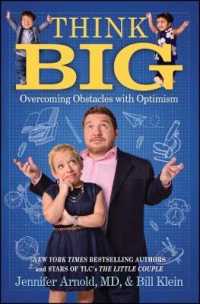- ホーム
- > 洋書
- > 英文書
- > Philosophy
Full Description
Now available in English—one of the twentieth century's most important works on the philosophy of technology
With this first English translation of influential German philosopher GÜnther Anders's 1956 masterpiece of critical theory, The Obsolescence of the Human, a new generation of readers can now engage with his prescient and haunting vision of a "world without us" dominated by technology.
Looking at technological events such as the detonation of the nuclear bomb and the arrival of televisions in our living rooms, Anders advances a warning of what humanity looks like in a world where it has surrendered all agency. He outlines the new emotional landscapes that shape our relationship to increasingly capable technology, including Promethean shame, the human sense of unease our own superior technological innovations can instill. Confronting the growing gap between what we can collectively create and what we can individually comprehend, Anders speculates on the trajectory of a developing technological world that rapidly exceeds our ability to control or even foresee its negative consequences.
The Obsolescence of the Human prefigures contemporary posthumanist discourse and is eerily predictive of current debates around automation, global warming, and artificial intelligence. Providing new ways to conceptualize the intersection of technology and emotion, it offers groundbreaking frameworks for future-oriented ethics. Radical in both its stylistic experimentation and its theoretical insights, this new translation presents a cautionary tale regarding the human capacity to usher in its own destruction.
Retail e-book files for this title are screen-reader friendly with images accompanied by short alt text and/or extended descriptions.
Contents
Contents
Translator's Preface
The Obsolescence of the Human, Volume 1
Preface to the Fifth German Edition
Introduction
1. On Promethean Shame
2. The World as Phantom and Matrix: Philosophical Reflections on Radio and Television
I. The Home-Delivered World
II. The Phantom
III. The Notification
IV. The Matrix
V. A Leap into General Perspectives
3. Being without Time: On Beckett's Waiting for Godot
4. On the Bomb and the Roots of Our Apocalypse Blindness
I. Opening Shock Observations
II. What the Bomb Is Not
III. The Human Is Smaller Than Itself
IV. Development of Moral Imagination and the Plasticity of Feeling
V. The Historical Roots of Apocalypse Blindness
VI. Annihilation and Nihilism
VII. Concluding Remarks
VIII. Appendices
Editors' Postscript. Scenes of Obsolescence: GÜnther Anders and the Method of Occasional Philosophy
Translator's Acknowledgments
Notes
Bibliography








